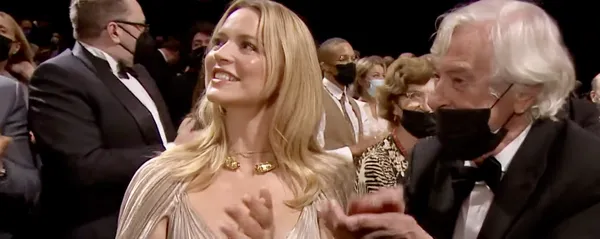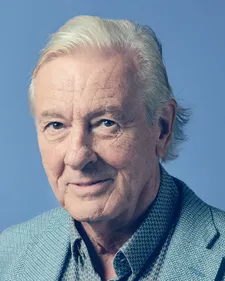 |
| Standing ovation for Benedetta star Virginie Efira and director Paul Verhoeven after the world premiere screening Photo: Courtesy of Cannes Film Festival |
Arch provovcateur Paul Verhoeven, whose Basic Instinct opened the Cannes Film Festival in 1992 and turned Sharon Stone into a star, is back on the Croisette creating waves with Benedetta, a French-language tale about lesbian nuns in 16th century Italy and, memorably, the use of a Virgin Mary figurine as a sex aid (of which more later).
After the red carpet premiere Verhoeven, 82, today faced the media with his main actors Virginie Efira and Daphné Patakia. Although he is used to storms and controversy about the way he has depicted sex and violence onscreen, the Dutchman in person has the mild-mannered air of an individual at peace with his world.
 |
| Virginie Efira on Verhoeven: 'Shooting is a democratic process … he asked for everyone’s opinions
and gave us great freedoms' Photo: Courtesy of Cannes Film Festival |
In recent years he has shunned Hollywood in favour of making European films such as the wartime resistance story Black Book and the rape thriller Elle (a Cannes hit in 2016), while gaining critical respect.
With Benedetta he proves he has lost none of his ability to shake up sensibilities. His interest in the project was sparked by his Dutch screenwriting colleague Gerard Soetman who gave him Judith C Brown’s book Immodest Acts: The Life of a Lesbian Nun in Renaissance Italy, written some 30 years ago.
He was intrigued by the fact that it was based on actual events in a convent when two of the nuns embarked on a lesbian relationship. “There was something intriguing about what people of the time were thinking about a lesbian love story. Nowadays we are not completely there but we are making a lot of progress. The differences between then and now was a reason to do the film. I wanted to look at life in that period.
“Then, of course, it was an interesting story because she was put on trial, accused of having a sexual relationship with another woman. So there was a plot and a kind of narrative, except, of course, it is an academic book with hundreds of notes at the back. "
 |
| Paul Verhoeven: 'What we had in the Seventies in terms of the sexual revolution in Holland has gone. I don’t think that is an improvement' Photo: Courtesy of Cannes Film Festival |
He enlisted the help of American screenwriter David Birke, who spent time with him in his house in The Hague to work out the narrative. “He managed the balance between religion, sexuality and the Church’s political scheming, which was not easy.”
Brown had stumbled across the story while researching another project in the archives in Florence. She opened up a box, and found the minutes of the trial of Benedetta, which took place in the early 17th century.
Verhoeven says the original source is a rare document. “There are no other known trials of lesbians in the history of Christianity. Also, I was struck by just how precise the trial and the book are in the description of sexuality. In the original document, the clerk of the court was so shocked by the sexual details described by Bartolomea, the nun who slept with Benedetta, that he could hardly write. He left blanks, scratched words out, rewrote them... Bartolomea was very explicit in her account of how they licked each other. It really is very interesting.”
Inevitably the scene in which Bartolomea and Benedetta use a statuette of the Virgin Mary as a dildo, has captured the attention of many commentators. Verhoeven is unrepentant: “It’s more than an object, it perfectly encapsulates the conflict between Catholic taboos and sex, between body and mind, which is present throughout the movie.
“For Bartolomea, it is just an object. For Benedetta, the object is of high symbolic value, but she abandons that on her journey to love. There is a shot where Benedetta and Bartolomea are performing forbidden sex acts, while in the background, the statue of the Virgin Mary is illuminated by a candle. That shot sums it up: let’s ignore rules and taboos, let’s do what we want.”
Rule-breaking and taboo-trouncing is what Verhoeven, of course, does best. In such a febrile atmosphere he succeeds in commanding the confidence of his actors. Virginie Efira positively purred with appreciation: “What was wonderful with Paul is the absolute trust he has in others. I asked how to prepare for the film and he said to me ‘You know what you have to do.’ That gives you a lot of confidence. Shooting is a democratic process … he asked for everyone’s opinions and gave us great freedoms.”
Verhoeven regards warily the creeping vogue of “new puritanism.” He laments: “What we had in the Seventies in terms of the sexual revolution in Holland has gone. I don’t think that is an improvement. At least not for me at any rate. Sexuality is the most essential element of nature. I’m always amazed people are shocked by sex in movies. Don’t forget, in general, people, when they have sex, they take their clothes off. So I’m stunned basically by the fact that we don’t want to look at the reality of life. Why this puritanism has been introduced — it is in my opinion wrong.”
Asked if Benedetta could be considered a distant cousin of the heroines of Basic Instinct, Showgirls, Black Book and Elle Verhoeven replied: “Yes. After the war, I went to elementary school, middle school, high school and university, and there were always girls and, later, young women, in class with me, so I grew up with the notion that there was no difference between what a man can do and what a woman can do, except for biological differences and the ability to bear children. In fact, girls were often better than me! I am happy that I grew up that way, aware from a very early age that women were the equals of men, if not better than men.”





















